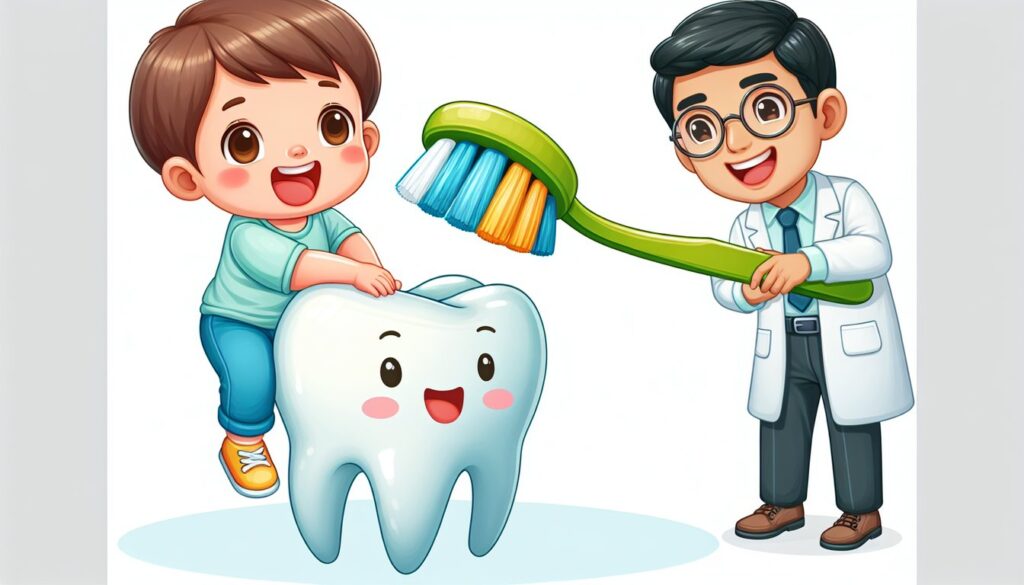
Our world is one where a child’s laughter is as precious as their health, and their smiles are a window to well-being. At Dr. Suzanne Land & Associates Family Dentistry, we cherish the importance of early dental care and recognize the silent threat posed by Early Childhood Caries (ECC). Under the nurturing guidance of Dr. Suzanne Land and team, we’ve built a sanctuary for family dentistry, where knowledge and prevention walk hand-in-hand. Join us as we explore the depths of ECC and arm you with effective strategies to prevent this common yetable condition in young children.
What is Early Childhood Caries (ECC)?
Early Childhood Caries is a form of tooth decay that affects infants and young children. Despite being largely preventable, it remains one of the most common infectious diseases in children worldwide. ECC can result in a spectrum of problems, from mild discoloration to severe infections leading to tooth loss, which, in turn, can impair a child’s ability to speak, eat, and learn.
Identifying the Risk Factors
Several factors contribute to the development of ECC:
- Prolonged exposure to sugary drinks, including milk, when a baby falls asleep with a bottle.
- Frequent snacking on sugary or starchy foods.
- Inadequate oral hygiene practices.
- Insufficient exposure to fluoride.
- Transmission of cavity-causing bacteria from mother to child.
Understanding these risks is crucial in forming an effective line of defense against ECC.
Prevention Strategies
Preventing ECC involves a combination of good oral health practices, dietary choices, and regular dental visits. Here are some strategies:
1. Establishing a Dental Home
Establishing a dental home early on is imperative. The American Academy of Pediatric Dentistry (AAPD) recommends that a child’s first dental visit should occur no later than their first birthday. This early start fosters a relationship between the dental team, the child, and the parents, paving the way for a lifetime of optimal oral health.
2. Oral Hygiene Practices
Good oral hygiene begins even before the first tooth erupts. Parents can clean their baby’s gums with a soft, damp cloth. As teeth emerge, introducing an appropriate-sized toothbrush and a smear of fluoride toothpaste can help keep those little pearly whites clean.
3. Balanced Diet and Feeding Habits
A balanced diet is essential for dental health. Here are some tips:
- Avoid putting your child to bed with a bottle of anything other than water.
- Limit sugary snacks and drinks between meals.
- Encourage drinking water, which can help rinse away food particles and bacteria.
4. Regular Dental Checkups
Regular checkups with a trusted family dentist like Dr. Suzanne Land can catch early signs of ECC. Professional cleanings, fluoride treatments, and parental education are integral to the prevention of dental caries.
The Role of Fluoride
Fluoride plays a critical role in preventing ECC by strengthening the enamel and making teeth more resistant to decay. The application of fluoride can be administered through several means:
- Fluoride Toothpaste and Mouthwash: As soon as a child’s teeth appear, brushing twice daily with a fluoride toothpaste can help fortify their enamel. For older children, incorporating a fluoride mouthwash can provide additional protection.
- Fluoride Treatments: During dental visits, Dr. Suzanne Land and her team can apply professional fluoride treatments. These treatments are highly effective in remineralizing the teeth and preventing decay.
- Fluoridated Water: Encouraging the consumption of fluoridated water can be a simple yet effective way to ensure children receive adequate fluoride. Check if your local water supply is fluoridated, or consider discussing fluoride supplements with your dentist if it is not.
Educating Parents and Caregivers
One of the most critical components of preventing ECC is education. Parents and caregivers need to be informed about the importance of maintaining oral hygiene from infancy. Dr. Suzanne Land and her team provide comprehensive guidance on best practices, from proper brushing techniques to dietary advice. Empowered with this knowledge, parents can play a proactive role in their child’s oral health.
Addressing ECC Early
Despite the best preventive measures, early signs of ECC can sometimes appear. Early intervention is key to preventing more severe issues. Watch for signs such as white spots on the teeth, which may indicate the beginning stages of decay. If any abnormalities are observed, scheduling an immediate dental visit is crucial.
Creating a Positive Dental Experience
At Dr. Suzanne Land & Associates Family Dentistry, we strive to make each dental visit a positive and stress-free experience for children. Our compassionate approach and child-friendly environment help reduce anxiety, making it easier for children to develop healthy attitudes towards dental care.
Conclusion
Early Childhood Caries is a preventable condition, but it requires diligent care and attention. By understanding the risk factors, implementing effective prevention strategies, and maintaining regular dental visits, we can protect our children’s smiles and ensure their overall well-being.
At Dr. Suzanne Land & Associates Family Dentistry, we are committed to partnering with parents to combat ECC and promote a lifetime of healthy smiles. Under the expert care of Dr. Suzanne Land, we provide the highest quality of family dental care in a nurturing and educational environment.
Connect with Us
If you have any questions or concerns about your child’s dental health, or if it’s time to schedule their first dental visit, don’t hesitate to reach out. Contact Dr. Suzanne Land & Associates Family Dentistry in Moorestown, NJ, and let us help you safeguard your child’s beautiful smile. Together, we can ensure that every child’s laughter remains as bright and joyful as ever. You can like and follow us on Facebook and Instagram for more tips and information.
